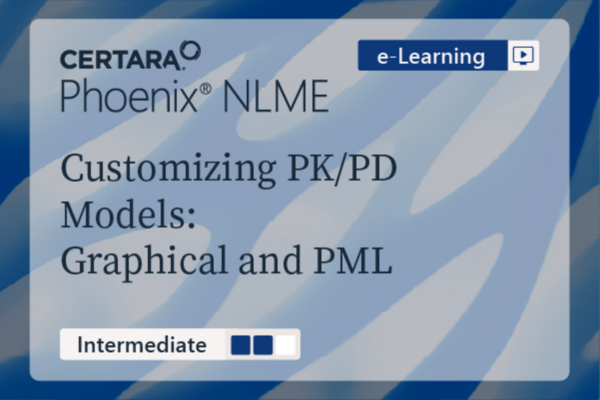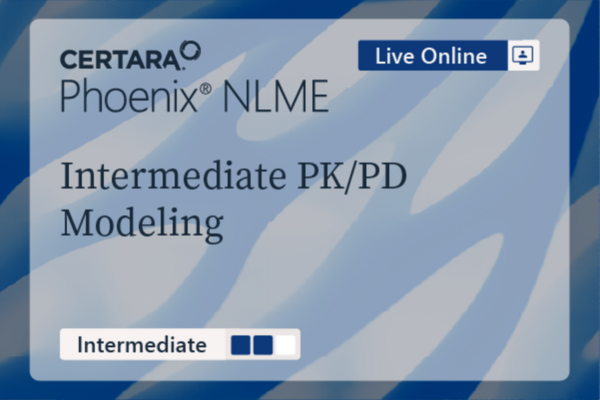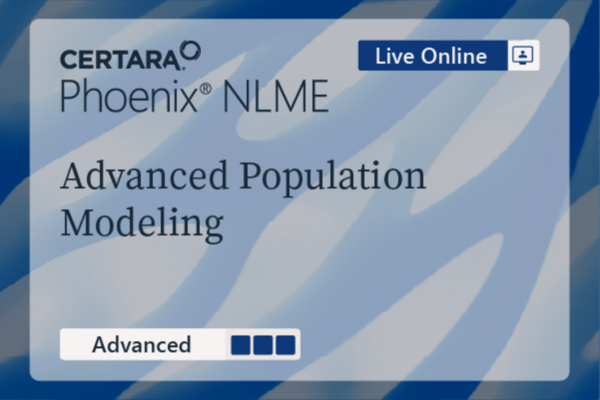
Cost - $525 (Academia $250) Course Description This course is intended for Phoenix users who want to extend beyond library models, to model their own data. It provides a solid foundation and a structured approach to model building, to create your own PK and PK/PD models. This highly practical course gives an accelerated introduction to customizing models with both the Graphical and Textual model editors in Phoenix. It assumes that you have ideas for PK and/or PK/PD models that you want to construct, and you mainly need to know how to implement them in either the Graphical or Textual modes. The course includes a basic introduction to PK/PD modeling and population PK modeling. There are about 3 hours of video in the course, plus interactive exercises. You should expect to spend about 12 hours of work to finish. You will have access to this course for a period of 3 years after purchase. If you are an academic user, please contact us so we can update your account profile to give you access to academic pricing. Note that you must register with an email address that is associated with an academic institution to get academic pricing. If you are located in Africa or India, please contact us so we can so we can update your account profile to give you access to the Africa/India pricing. You will need to provide proof that you are physically located in India to get the pricing. Prerequisites Learners who take either the e-learning course (100-OD) Introduction to Phoenix WinNonlin or the live online course (123-LO) PK Modeling and Simulation using Phoenix WinNonlin should have sufficient background to take this course. Alternatively, learners should have knowledge/skills in the following areas: Knowledge of basic concepts of PK models Using Phoenix PK Library models (i.e., using the built-in options) Obtaining initial estimates for PK models (using NCA or other methods) Evaluating the fit of PK models Other Related Courses The following courses provide a deeper theoretical background, and provide a good complement to this course: (200-OD) Intermediate PK/PD Modeling using Phoenix WinNonlin (201-OD) Intermediate Population Modeling using Phoenix NLME Read more

November - December 2026 Cost - $575 (Academia $275, India $150) Course Description The objective of this intermediate course is to consolidate knowledge of PK/PD concepts and advance to performing more complicated PK/PD modeling using Phoenix WinNonlin and Phoenix NLME. You will learn how to customize your own models beyond library models, how to interpret and present your results, perform simulations, and how to deal with different types of covariates such as occasion covariates, and much more. This course will also cover pharmacodynamic concepts and examples. Many case studies will be presented (please see agenda below). If you are an academic user, please contact us so we can update your account profile to give you access to academic pricing. Note that you must register with an email address that is associated with an academic institution to get academic pricing. If you are located in India, please contact us so we can provide a coupon that will give 75% off the full price of the course. You will need to provide proof that you are physically located in India to get the coupon. Course Format, Language and Dates This course format is as a ‘Live on-line classroom’ which means that the course is delivered virtually by an expert Phoenix instructor at pre-specified times. This format provides the benefit of the classroom setting, with real-time interaction with the instructor but without the travel. Although live attending is encouraged, recordings of the sessions are available to participants during the length of the course. You will have access to the recordings for 3 months following the last session of the course. This course will be delivered in English. Lecture/Demo Sessions Live Zoom sessions will occur in November and December, 2025. There will be six two-hour lecture/demo sessions. Lecture/Demo sessions are on Tuesdays at 10 AM New York (GMT-4), starting 4 November and finishing on 16 December. We will record sessions and post the recordings for those who are unable to attend live. You will have access to the recordings for 3 months following the last session of the course. Self-Paced Exercises There are five self-paced exercises in the course that guide you through exploratory data analysis, data preparation, and noncompartmental data analysis. You do not need to run Phoenix to do the self-paced exercises, because everything is contained in the module. Each practice exercise contains a quiz that you must pass with at least a 60% score, although you can repeat each quiz as many times as you need to pass it. Hands-on Exercise Sessions There are also five weekly "Hands-on Exercise" Zoom sessions that give you the opportunity to carry out the same analysis as in that week's "Self-Paced Exercise", working collectively in Phoenix. You will be divided into small groups, and will work together on the exercise. At least one in each group will need to have Phoenix running on their computer and have an active WinNonlin license. Hands On Exercise Session Option A is offered at times most convenient for participants in the Americas, Europe, and Africa. They are on Fridays at 11 AM New York (GMT-4). Hands On Exercise Session Option B is offered at times most convenient for participants in Asia/Pacific. They are on Tuesdays at 2 PM Brisbane (GMT+10). (FYI, 2 PM Tuesday in Brisbane is late Monday evening in New York.) Prerequisites and Time Commitment Good knowledge of PK/PD concepts including compartmental models for both individual and population. Experience with the functionality of Phoenix WinNonlin and Phoenix NLME software. Prerequisite background courses or similar experience include: [(123-LO) PK Modeling and Simulation and (124-LO) Introduction to Population Modeling] or [(100-OD) Introduction to Phoenix WinNonlin and (101-OD) Introduction to Population Modeling] Students are expected to be able to commit 5 hrs a week to attend sessions and complete assignments. Software Phoenix WinNonlin and Phoenix NLME Participants are expected to have a current license to Phoenix WinNonlin and Phoenix NLME. If a 60-day software license is needed one can be provided for an additional fee. Contact us if you want to order a license. Read more

Cost - $150 for Academics (free with purchase of RsNLME, $150 for Africa/India) Course Description This course is free for all who purchase RsNLME or Phoenix NLME. If you have paid for RsNLME or Phoenix NLME, you can get this course for free, so contact us for a coupon code that will make the course free. (Because RsNLME is free for academics, academic users will need to purchase this course for $150.) This course is intended for R Speaks NLME (RsNLME) users who need to know how to encode models in the Pharmacometrics Modeling Language (PML) used in Phoenix and RsNLME. It provides a solid foundation and a structured approach to model building, to create your own PK and PK/PD models. This highly practical course gives an accelerated introduction to writing PML models. It assumes that you have ideas for PK and/or PK/PD models that you want to construct, and you mainly need to know how to implement them in PML. The course includes a basic introduction to PK/PD modeling and population PK modeling. If you are an academic user, please contact us so we can update your account profile to give you access to academic pricing. Note that you must register with an email address that is associated with an academic institution to get academic pricing. If you are located in Africa or India, please contact us so we can so we can update your account profile to give you access to the Africa/India pricing. You will need to provide proof that you are physically located in India to get the pricing. There are about 1.5 hours of video in the course, plus interactive exercises. You should expect to spend about 6 hours of work to finish. You will have access to this course for a period of 3 years after purchase. Prerequisites Learners who take our introductory compartmental modeling course, which is offered in both live online and e-learning formats: (123-LIVE-CERT) Phoenix WinNonlin (Part 2) PK/PD Modeling Certification Course (Live Online) (123-OD-CERT) Phoenix WinNonlin (Part 2) PK/PD Modeling Certification Course (e-Learning) (If you took your training before these courses were launched, it could have a different course number: 100-CL, 100-OD, 123-LO, 123-LIVE) Alternatively, learners should have knowledge/skills in the following areas: Knowledge of basic concepts of PK models Using PK Models (in Phoenix or other modeling platform) Obtaining initial estimates for PK models (using NCA or other methods) Evaluating the fit of PK models Read more

Cost - $1,000 (Academia $500, Africa/India $250 Course Description This course aims to give the course participants confidence and encouragement to learn advanced topics in PK/PD data analysis, and to practice on real life case studies from discovery, preclinical and development. Lectures cover many topics including nonlinear absorption, nonlinear disposition, binary PD outcomes, experimental design, target mediated drug disposition, instantaneous and delayed drug responses, effect-compartment, turnover and binding models, modeling tolerance and rebound, transduction, and an introduction to population PK. If you are an academic user, please contact us so we can update your account profile to give you access to academic pricing. Note that you must register with an email address that is associated with an academic institution to get academic pricing. If you are located in Africa or India, please contact us so we can so we can update your account profile to give you access to the Africa/India pricing. You will need to provide proof that you are physically located in India to get the pricing. Software Used Phoenix WinNonlin™ and Phoenix NLME™ A temporary (30-day) license is provided to subscribers of this course. When you are ready to start the practice exercises in this course, contact us to request your license. Accessing the Course After registering for this course, login to www.certarauniversity.com and you will see the course on your Dashboard. You will have access to this course for a period of 3 years after the purchase. The purchase is for a single seat in the course. No sharing the login between different individuals is allowed. Additional seats must be purchased if more than one person wishes to take the training course. Course Length: The course provides approximately 10 hours of video instruction which includes a practical component that you can do at your own pace. It is expected to take participants about 40+ hours to complete, including time to perform the tasks in Phoenix. Prerequisites Participants need to have a good understanding of Phoenix WinNonlin and PML coding (for custom models). Participants should also be able to perform the tasks in the following Certara University courses: Intermediate PK/PD Modeling Using Phoenix WinNonlin (On-Demand 200-OD) Instructor Tom Jones Tom Jones has helped thousands of scientists become proficient with using Certara software in their research in the pharmaceutical industry. After completing his Ph.D. in analytical chemistry, he spent several years as an assistant professor, during which time he applied molecular modeling to teaching and research in chemistry, and then came to Certara, where for 18 years he has applied his passion for teaching scientific software applications. At first Tom was focused exclusively on molecular modeling applications in drug discovery and later broadened his expertise to include informatics and PK/PD modeling and analysis. He has created many training manuals, and you may very well have heard his voice in one of the numerous webinars and video demos he has created to help scientists become more proficient with Certara software. Dan Weiner Dan Weiner has extensive drug development experience and has served as an expert consultant to the U.S. Food and Drug Administration (FDA) on pharmacokinetic modeling and bioequivalence assessment. Prior to his previous tenure with Certara/Pharsight as a Senior Vice President and Chief Science Officer, Dr. Weiner held several management positions with Merrell Dow Pharmaceuticals; Statistical Consultants, Inc.; Syntex Development Research; Quintiles; and IVAX Research. Dr. Weiner graduated from the University of Kentucky with a doctoral degree in Mathematical Statistics, with emphasis on compartmental modeling. He is the original designer/author of the WinNonlin family of PK/PD Modeling Software now used by over 1,000 institutions. He is the co-author of Pharmacokinetic and Pharmacodynamic Data Analysis: Concepts and Applications, now in its 5th ed. Dr. Weiner is an Adjunct Associate Professor with Division of Pharmacotherapy and Experimental Therapeutics in the School of Pharmacy, University of North Carolina and is an Affiliate Professor of Pharmacometrics, Center for Translational Medicine in the School of Pharmacy at the University of Maryland. During his career he has provided PK/PD training to over 2,000 students. He is currently a consultant in model-based drug development. Read more

Cost - $1,000 (Academia $500, Africa/India $250) Course Description This course is designed to explore advanced techniques in pharmacokinetic and pharmacodynamics modelling and simulation that are directly applicable to current challenges in drug development. In depth theory is coupled with examples from current literature to provide a complete training experience. Topics include complicated population pharmacokinetic models, PK/PD modelling of oncology studies, modelling transit compartments, target mediated drug disposition, and extrapolation from adults to children. If you are an academic user, please contact us so we can update your account profile to give you access to academic pricing. Note that you must register with an email address that is associated with an academic institution to get academic pricing. If you are located in Africa or India, please contact us so we can so we can update your account profile to give you access to the Africa/India pricing. You will need to provide proof that you are physically located in India to get the pricing. Software Used Phoenix NLME™ A temporary (30-day) license is provided to subscribers of this course. When you are ready to start the practice exercises in this course, contact us to request your license. Accessing the Course After registering for this course, login to www.certarauniversity.com and you will see the course on your Dashboard. You will have access to this course for a period of 3 years after the purchase. The purchase is for a single seat in the course. No sharing the login between different individuals is allowed. Additional seats must be purchased if more than one person wishes to take the training course. Course Length: The course provides approximately 3 hours of video instruction which includes a practical component that you can do at your own pace. It is expected to take participants about 12+ hours to complete, including time to perform the tasks in Phoenix. Prerequisites Before attending this course, attendees should be familiar with creating models using PML (Phoenix Modeling Language). Participants should also be able to perform the tasks in the following Certara University courses: Introduction to Population Modeling using Phoenix NLME (On-Demand 101-OD) Intermediate Population Modeling using Phoenix NLME (On-Demand 201-OD) Instructor Carlos Rodríguez, Ph.D. Director, Clinical Pharmacology and PK/PD, PharmaPolaris International, Inc. Carlos Rodríguez has over 25 years of experience in the pharmaceutical industry in the areas of Clinical and Preclinical Pharmacokinetics, Drug Metabolism, Clinical Pharmacology, and Pharmacometrics. Dr. Rodríguez obtained a B.S. in Pharmacy from the University of Puerto Rico in 1986, and Ph.D. in Pharmaceutics from The University of Michigan in 1991. He joined The Upjohn Company in 1991 as a Scientist supporting preclinical pharmacokinetics and bioanalysis in the areas of CNS, metabolic diseases, cardiovascular, and anti-infectives. In 1997 he joined the clinical pharmacology unit (then Pharmacia & Upjohn), where he supported development projects in CNS and infectious diseases. In 2001, he became Associate Director of Pharmacokinetics at Chiron Corporation, where he supported small and large molecule programs in anti-infectives, oncology, and organ transplantation. In 2005, he became Director of Clinical Pharmacology at Roche Palo Alto, where he had direct responsibility over the clinical pharmacology development aspects of compounds in the anti-infective and inflammation therapeutic areas, including small and large molecules. He joined PharmaPolaris in 2007. Dr. Rodríguez has been involved in numerous IND submissions and participated in at least 10 NDA filings. In addition to Clinical Pharmacology, his research interests include Renal Drug Transport, Pharmacostatistical Modeling, Clinical Trial Simulation, and Population PK/PD. Dr. Rodríguez serves in the faculty of The University of Michigan, where he is Adjunct Associate Professor of Pharmaceutical Sciences, and in the faculty of the University of the Pacific, where he is Adjunct Professor of Pharmaceutics and Medicinal Chemistry. He lectures at the undergraduate and graduate levels in the areas of Pharmacokinetics, Physical Pharmacy, and Pharmacometrics. Read more

Cost: $250 / hr By purchasing this you can arrange to have one "office hour" with a specific trainer. The duration will be 60 minutes. Additional time can be arranged by purchasing this course again. When considering training office hours for the first time or for new project, please contact info@certarauniversity.com to discuss your needs prior to purchasing. Read more
Shopping Cart
Your cart is empty
